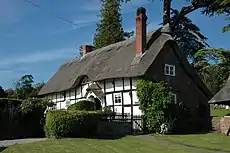cottage
English


Etymology
Late Middle English, from Anglo-Norman cotage and Medieval Latin cotagium, from Old Northern French cot, cote (“hut, cottage”) + -age (“surrounding property”), from Proto-Germanic *kutan, *kuta- (“shed”), probably of non-Indo-European origin, possibly borrowed from Uralic; compare Finnish kota (“hut, house”) and Hungarian ház (“house”), both from Proto-Finno-Ugric/Proto-Uralic *kota. However, also compare Dutch and English hut.[1][2]
Old Northern French cote is probably from Old Norse kot (“hut”), cognate of Old English cot of same Proto-Germanic origin.
Slang sense “public toilet” from 19th century, due to resemblance.
Pronunciation
- (General American)
- IPA(key): /ˈkɑtɪd͡ʒ/, [ˈkɑɾɪd͡ʒ]
- (weak vowel merger) IPA(key): /ˈkɑtəd͡ʒ/, [ˈkɑɾəd͡ʒ]
- (Received Pronunciation) IPA(key): /ˈkɒtɪd͡ʒ/
Audio (US) (file) - Hyphenation: cot‧tage
- Rhymes: -ɒtɪdʒ
Noun
cottage (plural cottages)
- A small house.
- A seasonal home of any size or stature, a recreational home or a home in a remote location.
- 1913, Joseph C. Lincoln, chapter 1, in Mr. Pratt's Patients:
- Thinks I to myself, “Sol, you're run off your course again. This is a rich man's summer ‘cottage’ and if you don't look out there's likely to be some nice, lively dog taking an interest in your underpinning.”
- Most cottages in the area were larger and more elaborate than my home.
-
- (UK, slang, archaic) A public lavatory.
- Synonyms: see Thesaurus:bathroom
- (Polari) A meeting place for homosexual men.
- Synonyms: gingerbread office, tea room, tearoom, teahouse, (US) tea house
Derived terms
- cottage bacon
- cottage cheese
- cottage cheese ass
- cottage food operation
- cottage fries
- cottage home
- cottage hospital
- cottage industry
- cottage loaf
- cottage orchard
- cottage orné
- cottage parent
- cottage piano
- cottage pie
- cottage pudding
- cottage suite
- electronic cottage
- summer cottage
- Swiss Cottage
- telecottage
Descendants
- → French: cottage
Translations
|
Verb
cottage (third-person singular simple present cottages, present participle cottaging, simple past and past participle cottaged)
References
- Kroonen, Guus (2013), “kuta”, in Etymological Dictionary of Proto-Germanic (Leiden Indo-European Etymological Dictionary Series; 11), Leiden, Boston: Brill, →ISBN, page 313-14
- Oxford English Dictionary, 1884–1928, and First Supplement, 1933.
French
Pronunciation
- IPA(key): /kɔ.taʒ/
Further reading
- “cottage”, in Trésor de la langue française informatisé [Digitized Treasury of the French Language], 2012.